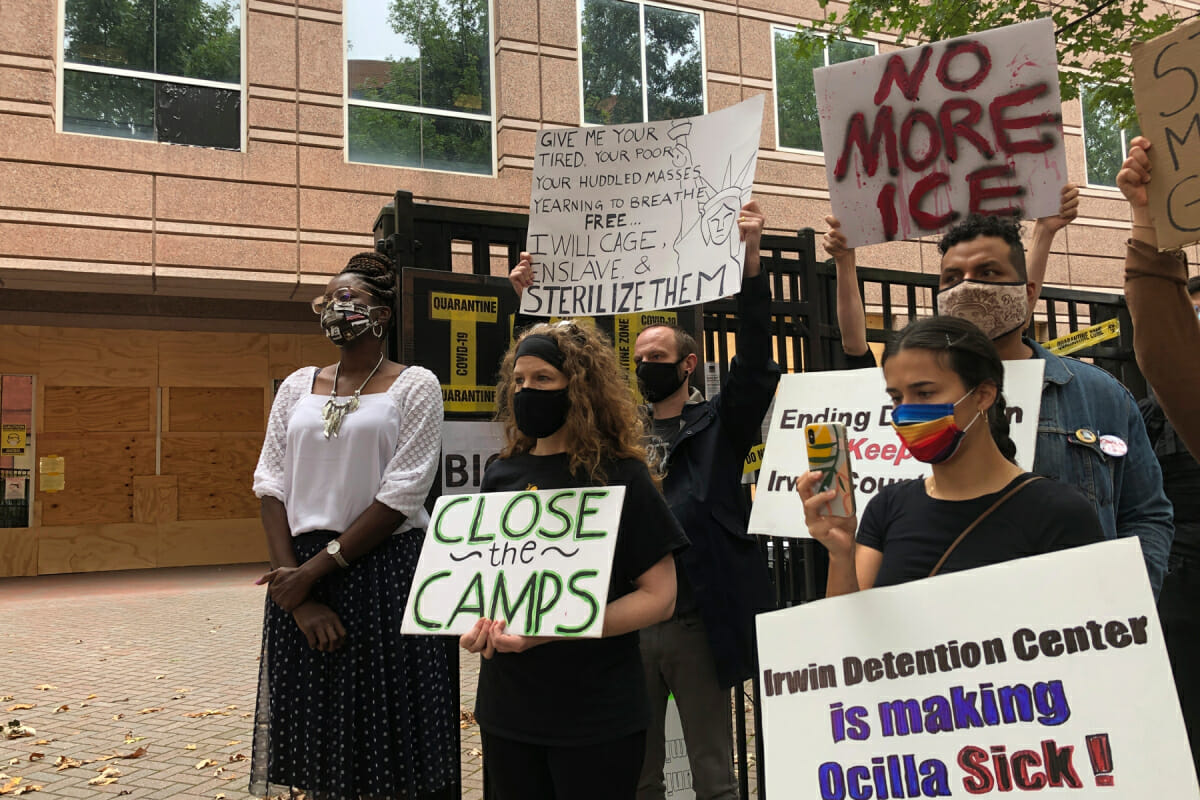
Protesters outside the Irwin County Detention Center in Ocilla, Georgia, on September 15th.
Jeff Amy/AP Images
Horrific hysterectomies

Rev. Dr. Debora Jackson
October 9, 2020
The nature of my organization means that I often get notices regarding abuses against women. All Girls Allowed was founded in 2010 to advocate against the practice of gendercide, the systematic killing of individuals based on gender. Sadly, I have read about atrocious attacks and abuses against women across the globe. But never did I expect the story that I read on September 14, 2020.
Dawn Wooten, a former nurse at the Irwin County Detention Center (ICDC) run by U.S. Immigration and Customs Enforcement, filed a whistleblower complaint alleging several egregious acts of medical abuse and neglect. However, what stopped me cold in the complaint were the reports by detained immigrants and ICDC nurses of high rates of hysterectomies performed on immigrant women. In the complaint, five different women reported undergoing hysterectomies between October and December 2019. While this may not seem a significant number, it is troubling to hear women compare the encounter to “an experimental concentration camp” where doctors were “experimenting with our bodies.” Informed consent was questionably obtained, as several women reported that they did not know what was happening to them. In the complaint, Wooten called the doctor performing these procedures a “uterus collector,” raising the red flag for her “that something was not right.”
Honestly, I am horrified and outraged. While the allegations are still under investigation, I cannot comprehend that in 2020 this practice would happen in the United States. What justification could there be to subject women to the atrocity of forced sterilization? Are immigrant women so meaningless that someone would think it right to sterilize them?
This matter is personal to me because the advances of gynecological medicine were gained at the expense of enslaved African American women. James Marion Sims, credited as being the “father of modern gynecology,” pioneered a surgical technique to repair a complication in childbirth that resulted in a tear between the uterus and bladder by experimenting on African American women. Moreover, his patients were subjected to these surgical procedures without anesthesia because of a belief that African people did not suffer pain. Additionally, these procedures were not conducted for the welfare of the woman, but rather for the benefit of slave owners who realized greater value in women who were able to reproduce.
As allegations of hysterectomies performed on detained immigrant women without informed consent are under investigation, I cannot comprehend that in 2020 this practice would happen in the United States. What justification could there be to subject women to the atrocity of forced sterilization?
This matter is personal to me because historically, hysterectomies were seemingly the procedure of choice by physicians treating African American women. Each of my maternal grandfather’s four sisters underwent hysterectomies. They suffered from uterine fibroids. The Black Women’s Health Imperative reports, “Relative to white women, black women are 2-3 times more likely to have fibroids, to develop them at younger ages, to have bigger fibroids, to have more fibroids, and to have more symptoms.” It is personal because I have had more than 15 fibroids removed in my life, but I am lucky. My gynecologists performed myomectomies—the surgical removal of uterine fibroids that leaves the uterus intact. My great aunts were not so fortunate. In their day, hysterectomies were done in response to virtually any complaint: heavy menstrual cycles, pelvic pain, or uterine fibroids. There was no regard to their desires for childbirth. Such decisions were taken out of their hands by medical practitioners.
It is personal because I realize that what was done to my ancestors may have had more sinister motives. The State of Indiana, where I was raised, was the first state in the world to pass a eugenics-based compulsory sterilization law. The practice, which sought to control the birth populations of people deemed “unfit” according to race or class standards, or “feebleminded” in terms of mental aptitude, forced sterilization on thousands of women in Indiana between 1907 and 1974. In the South sterilization was such a widespread practice that it had a euphemism: a “Mississippi appendectomy.”
African American women were not the only ones who suffered this fate. Between the 1930s and the 1970s, approximately one-third of the female population of Puerto Rico was sterilized, giving the island the highest rate of sterilization in the world. Additionally, in the 1970s, approximately 60,000-70,000 Native American women (40% of Native women in the United States at that time) underwent sterilization. It was only as complaints gained national attention through high-profile cases such as Relf vs. Weinberger that sterilization laws were overturned. In the Relf case, two sisters, ages 12 and 14, were sterilized in 1973 without proper consent as their mother, who could not read, unwittingly signed an X on a consent form having been told that she was consenting to birth control injections for her daughters.
My hope is that you, having read of these atrocities, would also take the alleged complaints personally and be moved to act. What can you do? First, contact your elected officials to demand investigation of the ICDC. In addition to forced sterilizations, the whistleblower complaint alleges failure to follow COVID-19 safety protocols, unsanitary conditions, and punishing immigrants who speak out against offenses. Because all are created in the image of God, we must do our part to prevent human rights abuses, particularly in our own country. Second, we can educate ourselves on the issue of gender-based violence. Women continue to be the victims of gendered power imbalances; therefore, we need to seek out and hear their stories so that we are more informed. And thirdly, as we better understand the issues, we must use our influence to speak out. Forced sterilization and other such abuses against women are not comfortable topics, but silence is simply not an option. These horrors must end.
The Rev. Dr. Debora Jackson is the Director of Operations for All Girls Allowed, a faith-based, non-profit that restores life, value, and dignity by empowering and educating women and girls and engaging outreach partners for global impact. She was previously the Director of Lifelong Learning at Yale Divinity School. Her newly released book “Meant for Good: Fundamentals in Womanist Leadership,” is available through Judson Press.
The views expressed are those of the author and not necessarily those of American Baptist Home Mission Societies.


